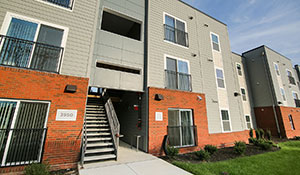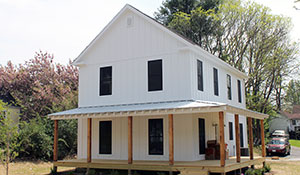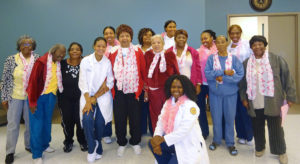October 30, 2017
Community Housing Partners (CHP) is among 20 nonprofit organizations from across the country competitively chosen for the Health Outcomes Demonstration Project, a new joint effort by NeighborWorks America and Enterprise Community Partners, two leaders in the community development and affordable housing fields. CHP is participating in this national initiative as a charter member of the NeighborWorks network.
As part of this exciting evaluation project, CHP will receive ongoing technical assistance, grant funding, peer learning, and measurement tools to help demonstrate and document the important connections between CHP’s senior programs and the health of residents living at CHP’s senior rental communities.
In particular, CHP is surveying residents at six CHP senior communities in Virginia and Maryland about health and wellness attitudes and behavior, including how residents are impacted by and manage chronic diseases. According to the National Council on Aging, 80 percent of adults 65 and older have at least one chronic disease condition such as heart disease or diabetes and 68 percent have two or more.
“We know that chronic disease has a significant impact on the senior population in general, but we don’t know how it is impacting low-income residents at our senior communities,” said Angie Roberts-Dobbins, Vice President of Resident Services, Community Housing Partners. “Through this initiative, we hope to identify best practices, determine which senior programs are most impactful, fill in the gaps through our own programs or partner-delivered programs, and possibly develop new partnerships to better serve our senior population.”
CHP recently completed the first round of three surveys of 124 seniors, which began in July, and will repeat the surveys to compare results a year from now. The participating properties are Bluegrass Apartments in Pulaski, Virginia; Grayson Manor Apartments in Independence, Virginia; Old Orchard Apartments in Pearisburg, Virginia; Lafayette Elderly Apartments in Williamsburg, Virginia; Tranquility at the Lakes in Virginia Beach, Virginia; and Primrose Place in Baltimore, Maryland.
Roberts-Dobbins and Marsha Underwood from CHP attended a two-day kick-off meeting in Washington, D.C., earlier this year that included orientation and the first steps of planning the evaluation project. The group also had the opportunity to hear from and discuss the importance and purpose of this project with its key funders.
“As the largest U.S. foundation that works solely on health, Robert Wood Johnson Foundation believes that everyone deserves to be healthy,” said Oktawia Wójcik, Ph.D., Program Officer, Robert Wood Johnson Foundation. “But now that involves much more than health care – it needs to be intermingled with other sectors, like community development, to really create healthier, more equitable communities. It takes organizations, like the ones in this important project, to be innovative and to change the mindset about what equity means by changing policy, leveraging financing, and activating partnerships.”
Over the project period, which runs through June 2019, CHP receives up to $45,000 in grant funds to support this evaluation effort. It will also receive direct technical assistant to carry out the outcome evaluation, the opportunity to engage and learn from peers at three in-person convenings, and a subscription to the Success Measures Data System to use the new Success Measures Health Tools to measure and document the health outcomes online.
Last month, the Success Measures Health Tools were shared with the public in a free online publication. Additionally, NeighborWorks America and Enterprise Community Partners will disseminate the results of the project nationally to the community development, public health, community health and related fields, contributing to the ongoing efforts to reduce health disparities and improve health for all Americans.
The Health Outcomes Demonstration Project is supported by the Robert Wood Johnson Foundation, The Kresge Foundation, NeighborWorks America, Enterprise Community Partners, The Hearst Foundation, Inc. and the U.S Department of Housing and Community Development, and by in-kind support from the Federal Reserve Bank of San Francisco.



